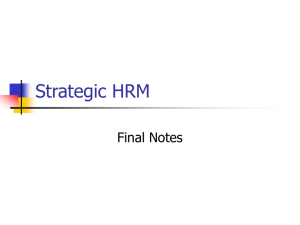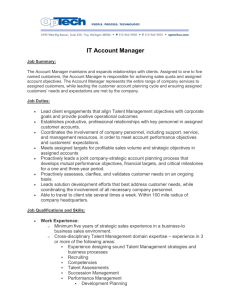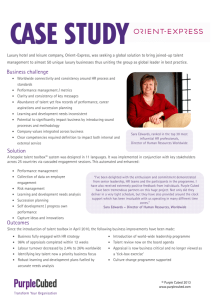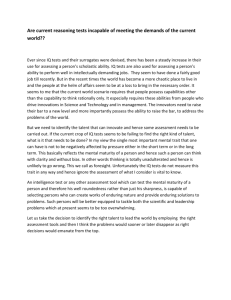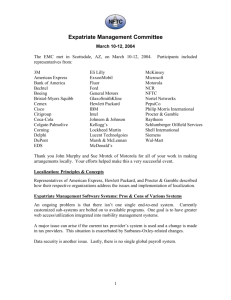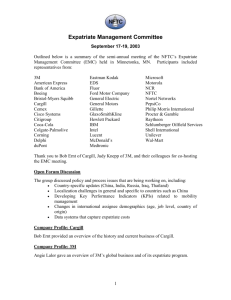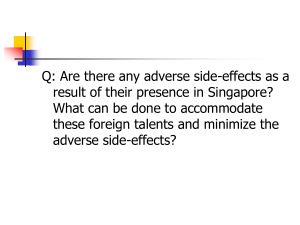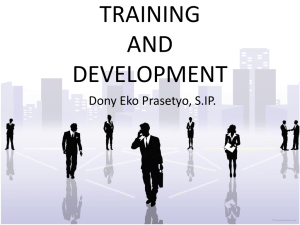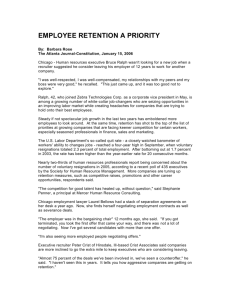Talent Management service offerings to Expatriate Compensation
advertisement
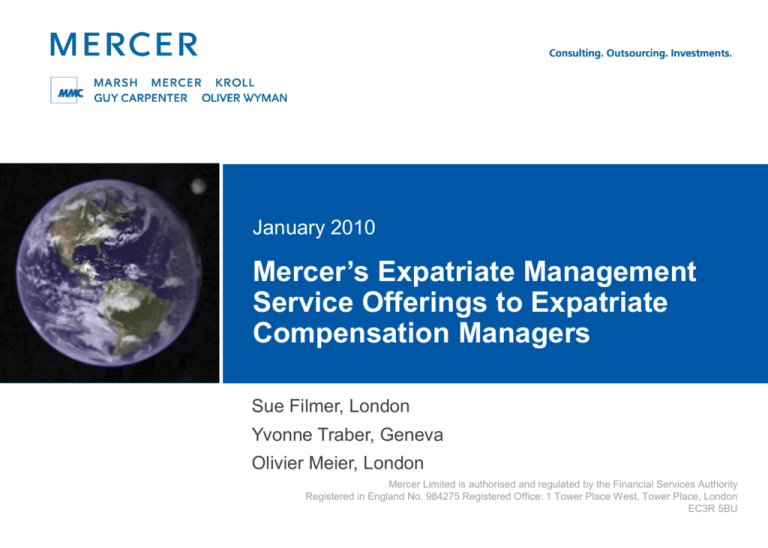
January 2010 Mercer’s Expatriate Management Service Offerings to Expatriate Compensation Managers Sue Filmer, London Yvonne Traber, Geneva Olivier Meier, London Mercer Limited is authorised and regulated by the Financial Services Authority Registered in England No. 984275 Registered Office: 1 Tower Place West, Tower Place, London EC3R 5BU Managing expatriates For many organisations the mobility of employees is an integral part of carrying out business. Indeed, the very idea of a “home country” is disappearing for some as their organisations, like their markets, become truly global. Workforces too are becoming increasingly multi-national as increasing numbers of individuals with transferable skills and capabilities pursue international career opportunities. In this environment companies find that they face significant challenges in managing their internationally mobile employees. Of particular challenge to expatriate and compensation managers is the need to maintain efficient international assignment policies and reward practices that are aligned to the business strategy, fit within commercial constraints and match international employees’ reward and career aspirations. Questions for consideration: Mercer’s 2008/2009 Benefits Survey for Expatriates and Globally Mobile Employees Mercer What drives your company to send employees on international assignments? Career and leadership development? Business expansion? Filling a position requiring technical skills? Fulfilling a project requirement? Who are your expatriates? Seasoned executives? Skilled professionals? Rising talents? Where are they coming from? Headquarters Operating companies Multiple locations International hires Nomads Where are they going to? Home host home Location to location 1 Managing expatriate talent and reward Many companies struggle to manage cross-border mobility well. From an employee perspective the various elements of the mobility process often appear disconnected and the experience of moving locations can be frustrating. From a business perspective mobility decisions often appear opportunistic rather than managed with strategic intent. To do international mobility well expatriate talent, reward and career management strategies and policies need to be aligned and coordinated: Expat talent management is about ensuring the business has the international talent it needs to be successful by predicting the future demand - quantity, quality and location – and planning to match this with supply - internal and external talent Expat reward management is about providing an expatriate compensation package that is competitive and rewards those who add value to the business whilst ensuring mobility costs make good commercial sense Expat career management is about influencing the career decisions of targeted individuals that the business needs to retain and develop for current and/or future business success using levers such as compensation, career planning and proactive assignment lifecycle management Done well, the business motivates and retains the international talents it needs for business success. Expatriate talent, reward and career management includes: The ROI is: Talent and reward segmentation on performance, potential and skills Effective and economic deployment of international talent Providing genuine career alternatives and reward options to key talent Minimising the avoidable loss of international talent Ensuring positive career outcomes for international talent Building the pipeline of future international talent Mercer 2 Linking expatriate reward and talent management In many organisations reward management and talent management are two distinct functions. While talent management is usually not part of the responsibility of expatriate and compensation managers, the talent and career management aspects of expatriation have a significant impact on expatriate policies and remuneration packages. Typical Expatriate Managers issues: How can I motivate employees to accept assignments in nondesirable locations and the limit of financial incentives e.g. expat allowances and premiums? How can the company retain expatriates particularly at the end of the assignment? How can we limit policy benchmarking without taking into account the career aspects and opportunities, or lack of opportunities, offered by the company? How do I develop policies such as expat terms and conditions that are in line with desired expat population segmentation and talent management objectives? Understanding the talent management implications and being able to take them into account when developing expat policies or producing mobility business cases is critical for expatriate managers. In addition, the growing pressure on expatriate costs combined with a need to manage an increasingly complex globally mobile workforce lead many companies to segment their expatriate policy and align remuneration with talent segmentation. Mercer provides its clients with a pragmatic response to the growing intricacy of expatriate talent and remuneration issues though practical workshops, insight analysis and comprehensive advisory services as well as benchmarking data, tools and technology. Mercer 3 Delete this text box to display the color square; you may also insert an image or client logo in this space. To delete the text box, click within text, hit the Esc key and then the Delete key Trends in the Management of Expatriate Talent and Reward Trends in the global professional workforce Going forward, effective expatriate management will require a greater level of co-ordination and alignment between business leaders, talent management, compensation and benefits, third-party providers and, of course, the employee and his/her family. This will need to be achieved through consistent mobility/HR policies and practices in all international locations, and effective and targeted communication. Expatriate management trends seen in the last 12 months: More differentiation and segmentation of the expatriate population Different policies depending on position level and purpose of the assignment Stronger differences according to industry sector Increase of localizations Increase of short term and project based assignments More interest for international pay structures for the ‘global nomads’ population Less exceptions and greater transparency Cost awareness, more control and clearer business objectives Better communication and monitoring Expatriate management trends anticipated in the longer term: Increasing numbers of internationally mobile employees A variety of assignment types, generations and employment expectations who may have very different (personal and career) objectives for taking an assignment One size expatriate talent and reward policies will not fit all # of Global Professionals DE M AN D SelfPropelled Globally Mobile Professionals (Global Citizens) Local Executives with Global Skills & Perspectives Company-Sponsored Expatriates 1960 1970 1980 1990 2000 2010 2020 2030 2040 YEAR Mercer Source: IMD 5 Segmentation to determine the primary purpose of mobility and the appropriate compensation and benefits packages There is a growing interest in expatriate segmentation. Expat segmentation enables a company to gain a deeper understanding into the reasons why the business needs to move people around, who should be included as a member of the mobile workforce, and the appropriate compensation packages. The most important criteria for segmentation should be the business drivers whilst the length of an assignment is important but is a secondary consideration. Together they inform the development and implementation of the co-ordinated talent and reward policies and practices. High Development Value Low International Learning and Developmental Experiences Emerging / HiPo talents Key Strategic Individuals Top strategic talents / The Most Valuable Players Opportunistic moves Key experienced professionals Volunteers / Own personal career & life objectives Key skill / Resource deployment Primary driver: business-led resource planning and deployment Low High Corporate Value Focus Host Importance of expatriate assignment Expatriate talent segmentation aligned with the mobility policy Expatriate talent segmentation Primary driver: corporate-led career pathways and succession management Short term assignee Long term assignee Key Strategic individuals (MVP) Key Experienced individuals Global nomad High Flyer Expat + Expatriate Emerging Talent Development Local + Volunteers Local Good segmentation provides Business Value insights into: Length of expatriate assignment Current and future expatriate populations International talent management and reward issues and solutions Minimising the attrition rate of key expatriate talent Total rewards strategy to ensure compensation alignment with mobility and talent management priorities Governance and processes required to effectively manage and reward the differing internationally mobile talent pools Mercer 6 The talent perspective Why do your international talents choose to remain in your company? Organisations are increasingly seeing their international talents as a distinct and highly valuable talent group, and with this in mind ask themselves whether their international talents believe: International experience is valued by the business? International work is rewarded fairly? Taking part in international development leads to faster promotions or provides greater career choices? Appropriate levels of effort is put into retaining and motivating international talent? Talent management is not easy, and international talent management brings additional challenges with it including: Having a reward proposition that encourages and facilitates mobility for key talent groups and provides appropriate incentives to encourage employees to accept assignments Maintaining a global talent and career management infrastructure that is aligned with the global reward strategy to provide a healthy pipeline of mobile talent that can be deployed across the global operations Career movement and on-going talent, performance and reward management of individuals across organisational, geographic and cultural boundaries Providing regular, motivational and informed developmental and next-move career discussions with a dispersed population to ensure skills and capabilities gained in one location are utilised, developed and rewarded in subsequent assignments Offering consistent and competitive expatriate packages globally and having market benchmarking data that is relevant to specific international talent categories With an increasing top management focus on ensuring the retention of key international talent and the value of the commercial return on international mobility, there is a growing interest in ensuring alignment between the management of international talent and the reward of international talent. Mercer 7 Delete this text box to display the color square; you may also insert an image or client logo in this space. To delete the text box, click within text, hit the Esc key and then the Delete key How can Mercer help clients? Managing Expatriate Talent - how can Mercer help? Mercer can help you address your expatriate management challenges by working with you to: Develop the right international talent strategy, map, profiles, career paths and practices to achieve the required business results Define the right compensation & benefit models adapted to the purpose of the assignments Design the right expatiate management processes and infrastructure Mercer’s international talent and compensation services fall into three categories: The RIGHT International Strategy Mercer The RIGHT International Policy & Operational Processes The RIGHT International Knowledge & Technology 9 1. Expatriate management workshop to explore the challenges with the current expatriate management policies and practices Objectives Mercer’s Expatriate Management Workshops are brainstorming sessions designed to analyse and discuss in detail a company’s policy and practices. During the session Mercer’s mobility experts provide benchmarking advice and facilitation to assist HR teams address specific expatriate management issues or more generally to conduct an audit of the company’s situation. Format A half-day or a one day in-house session. A preliminary discussion with the HR team takes place prior the workshop to clarify needs and expectations as well as to gather information about the company practices and demographics. Added value Access to a pool of expert covering all aspects of expatriate management (including compensation, benefits, talent management, healthcare, communication and HR processes) and offering a holistic approach to expatriate management. Mercer’s workshops provide HR teams with an opportunity to review and discuss in detail their policies and practices before preparing a business case for management to support change or before embarking on a major investment or project, e.g. new policy, centralisation/decentralisation, outsourcing. Pricing guide: Euro 2.5K half-day session / Euro 4.5K one-day session / Euro 7K two-day session Mercer 10 2. Analysis of the current expatriate policies and practices to arrive at recommendations for improvement 1 Data and Diagnosis Understand future business mobility requirements Translate business needs and key workforce issues into global mobility imperatives Proce ss integr ation egy and Inten t Update/create mobility strategy to better fit future business needs Gather data on current Conduct gap analysis state from multiple perspectives (e.g., business leaders, assignees) 33 2Strat Facilitate workshop to validate strategy; prioritize gaps to close Identify ROI measures Define required process integration Determine specific changes required to drive desired mobility strategy and assignee experience 4 Imple menta tion Create multi-year plan for executing and implementing Prioritize actions Design and model options for integrating mobility processes Outline service delivery model, roles, linkage, information flow requirements Pricing guide: Typical consulting fees Euro 15K-Euro 30K Mercer 11 3. Design and implementation of a new and integrated reward and talent strategy, policy and practices for effective expatriate management 1 Assess the business context Review of existing Desig 33 2 Diagn ostic analy sis Employer perspective -– n the expat riate strate gy Production of the Executive Interviews expatriate talent and expatriation, reward and rewards strategy talent strategies, policies, Employee perspective – documents and data Web based survey Draft rewards and talent policies, processes and Workshops and interviews External perspective operating model with stakeholder groups Mercer intellectual capital (e.g. management, and surveys on market Secure board approval assignees, reward team, trends and practice talent team, local expat managers, etc) Assessment of sustainable ongoing costs Establish issues with current approach and Detailed develop best future fit recommendations recommendations Agree 4 & comm unicat e chang e Agree the change agenda and iimplementation plan Communication to key stakeholders Communication strategy plan Pricing guide: Typical consulting fees Euro 30K – Euro 50k Mercer 12 4. Mercer's suite of expatriate management tools to assist clients with effective expatriate management 1 International Comparisons / Overview / trends Host-based salaries Paying expatriates like locals Global Insights Publications Expatriation trend surveys Local data services PayMonitor Total Remuneration Global Pay Summary WBEG Int. GEO Salary differentials International Car Policies Total Employment Costs Managing China’s Hr Environment Managing India’s HR Environment Global Compensation Planning report International Assignment Survey Expatriate Benefits Survey Mercer 3 2 Surveys Local benefits surveys Bespoke surveys Job Pricing International Position Evaluation system Home-based salaries Adjusted salaries Expat allowances Expatriate reports Global HRMonitor Cost-of-living reports Quality-of-living/hardship reports Short-term assignment allowances Tax reports Employee mobility guides Statutory Benefits reports Employment conditions reports Balance sheet calculations Online calculators on Global HRMonitor 4 Other expat issues Bespoke analyses MercerPassport ExpatMonitor Bespoke surveys Policy benchmarking Online cultural training tools (MercerPassport) Expatriate compensation management tool (ExpatMonitor) 13 Mercer Limited is authorised and regulated by the Financial Services Authority Registered in England No. 984275 Registered Office: 1 Tower Place West, Tower Place, London EC3R 5BU
